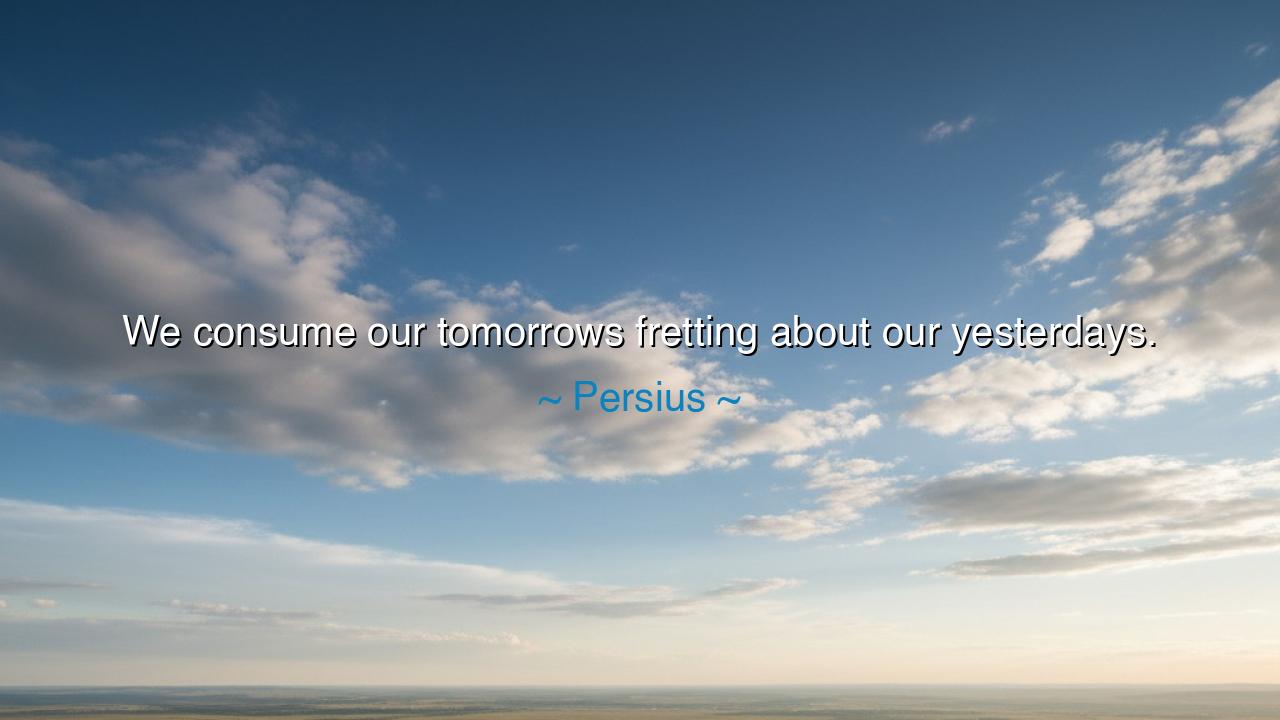
We consume our tomorrows fretting about our yesterdays.






Opening Scene – Narrated by Host
The room was still, with only the soft sound of the ticking clock filling the space. Jack sat at his desk, lost in thought as he stared out the window, his mind reflecting on a quote that had struck him earlier. It wasn’t just about time—it was about the way we often waste it, trapped in regrets or anxieties.
Jeeny walked in, noticing Jack's distant expression. She set a cup of tea on the table beside him and sat down across from him, her curiosity piqued.
Jeeny: “You seem like you’re thinking about something pretty heavy. What’s on your mind?”
Jack blinked, coming back to the present, and smiled faintly before taking a sip of his tea.
Jack: “I was thinking about something Persius said: ‘We consume our tomorrows fretting about our yesterdays.’ It really made me reflect on how often we get caught up in regret, in the past, and how that prevents us from fully living in the present—or even planning for the future.”
Jeeny sat back, her eyes thoughtful as she considered his words.
Jeeny: “That’s such an interesting way to look at it. We often get so stuck in the past—whether it's mistakes we’ve made, things we wish we had done differently, or things we regret— that we miss out on the opportunities right in front of us. Persius seems to be saying that by focusing on our yesterdays, we end up draining our potential for tomorrow.”
Jack: “Exactly. It’s like we’re borrowing from our future by worrying about what’s already been done. Instead of using our time to move forward, we spend so much of it revisiting the past. The more we fret about our mistakes or missed opportunities, the less energy we have to focus on what’s ahead of us. And in the end, we waste the time we have now.”
Host: The conversation deepened as Jack and Jeeny reflected on the nature of time and how we often misuse it. Persius’ words weren’t just about regret—they were about the way we allow the past to control our present, and how that influences our ability to move forward. The idea of “consuming our tomorrows” was a reminder that our focus on yesterday could take away from what we could be building today and tomorrow.
Jeeny: “It’s almost like the past becomes this anchor, holding us in place. It’s not that we shouldn’t reflect on our past—reflection can help us learn—but when we’re constantly looking backward, we can’t see where we’re going. We end up paralyzed by it, stuck in a loop of ‘what ifs.’”
Jack: “Right. And it’s exhausting. Constantly worrying about the past doesn’t change anything—it just drains our energy. And by doing that, we’re not only preventing ourselves from moving forward, but we’re also letting those regrets define us. We let them control our actions instead of taking control of our own future.”
Jeeny: “Exactly. What’s interesting is that by focusing so much on the past, we miss the beauty and the potential of now. The present is the only time we actually have to act, to make decisions that will shape our future. But when we’re stuck in the past, we’re not living in the present, and we’re certainly not preparing for what’s to come.”
Host: Jack smiled, the weight of their conversation settling in. Persius’ words had opened his eyes to the way time often slipped through his fingers, consumed by thoughts of what could have been, instead of focusing on what was still possible. Time was precious, and every moment spent in regret was a moment that couldn’t be reclaimed.
Jack: “So, maybe the lesson here is that we have to stop letting the past consume us. Yes, we should learn from it, but we can’t let it take up our future. We need to focus on the present, on what we can do now to move forward, instead of wasting time thinking about what’s already behind us.”
Jeeny: “Exactly. It’s about using our time wisely—focusing on the future and what we can build, but also appreciating the present for what it is. It’s a reminder that our time is finite, and we don’t want to waste it dwelling on things we can’t change. We can only control what happens now and in the future.”
Climax and Reconciliation
The room felt quieter now, as Jack and Jeeny reflected on the true meaning of Persius’ words. Outside, the world continued its steady rhythm, but inside, they had discovered something deeper: the way we spend our time shapes our future. By focusing on the present and moving forward instead of dwelling on the past, we could make the most of the moments we had and build a better tomorrow.
Jack: “So, it’s really about taking responsibility for how we use our time. We can’t let our past consume us. Instead, we need to embrace the present and create something meaningful for the future.”
Jeeny: “Exactly. Time is the one thing we can never get back. By choosing to live in the present, we’re allowing ourselves the freedom to shape our future.”
Host: The conversation settled into a quiet understanding. Time, once consumed by regret, could be reclaimed by living in the present and focusing on the possibilities of tomorrow. Persius’ words were a reminder that we had the power to choose how we use our time—and in doing so, we could create the life we wanted.






AAdministratorAdministrator
Welcome, honored guests. Please leave a comment, we will respond soon